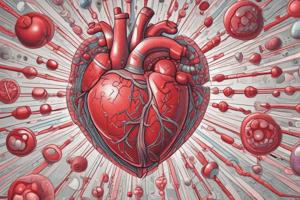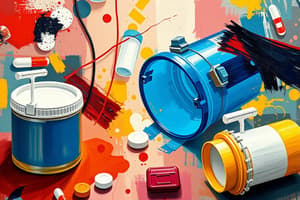Podcast
Questions and Answers
What is the primary function of Abciximab, Eptifibatide, and Tirofiban in the treatment of cardiovascular conditions?
What is the primary function of Abciximab, Eptifibatide, and Tirofiban in the treatment of cardiovascular conditions?
- They inhibit platelet activation. (correct)
- They are used for heart surgery.
- They dissolve existing blood clots.
- They completely reverse anticoagulant effects.
Which anticoagulant medication is specifically mentioned as not being reversible?
Which anticoagulant medication is specifically mentioned as not being reversible?
- Low-molecular-weight heparin (correct)
- Bivalirudin
- Abciximab
- Unfractionated heparin
What is the primary use of fibrinolytics like Activase in emergency situations?
What is the primary use of fibrinolytics like Activase in emergency situations?
- To prevent myocardial infarction.
- To strengthen blood vessels.
- To dissolve blood clots. (correct)
- To promote platelet aggregation.
What is a major concern associated with the use of fibrinolytics?
What is a major concern associated with the use of fibrinolytics?
In which scenario might bivalirudin (Angiomax) be administered?
In which scenario might bivalirudin (Angiomax) be administered?
What is the primary action of nitroglycerin in the treatment of cardiac conditions?
What is the primary action of nitroglycerin in the treatment of cardiac conditions?
Why is continuous blood-pressure monitoring necessary when administering nitroglycerin?
Why is continuous blood-pressure monitoring necessary when administering nitroglycerin?
What is the maximum total dose of morphine that can be administered intravenously for chest pain?
What is the maximum total dose of morphine that can be administered intravenously for chest pain?
Which class of drugs is not considered an antihypertensive?
Which class of drugs is not considered an antihypertensive?
What is a common side effect associated with the use of morphine?
What is a common side effect associated with the use of morphine?
Which of the following angiotensin II receptor blockers (ARBs) is correctly matched with its common ending?
Which of the following angiotensin II receptor blockers (ARBs) is correctly matched with its common ending?
What should be done if hypotension occurs during morphine administration?
What should be done if hypotension occurs during morphine administration?
Which medication is indicated when chest pain does not resolve with nitroglycerin?
Which medication is indicated when chest pain does not resolve with nitroglycerin?
What is the primary purpose of diuretics in heart failure management?
What is the primary purpose of diuretics in heart failure management?
What type of medications are ARBs primarily used for?
What type of medications are ARBs primarily used for?
Which medication class is effective in reducing platelet aggregation?
Which medication class is effective in reducing platelet aggregation?
What is the function of HMG Coenzyme A Reductase Inhibitors (Statins)?
What is the function of HMG Coenzyme A Reductase Inhibitors (Statins)?
What is a common side effect of clopidogrel as an antiplatelet medication?
What is a common side effect of clopidogrel as an antiplatelet medication?
How do Glycoprotein IIb/IIIa inhibitors affect platelets?
How do Glycoprotein IIb/IIIa inhibitors affect platelets?
Which medication is typically used in conjunction with aspirin for managing UA/NSTEMI?
Which medication is typically used in conjunction with aspirin for managing UA/NSTEMI?
What is the goal of using antihyperlipidemic drugs?
What is the goal of using antihyperlipidemic drugs?
What does the acronym MONA represent in the context of initial treatment options for acute coronary syndrome?
What does the acronym MONA represent in the context of initial treatment options for acute coronary syndrome?
What is the standard recommended dosage of aspirin for treating acute coronary syndrome?
What is the standard recommended dosage of aspirin for treating acute coronary syndrome?
Which of the following actions does nitroglycerin perform to alleviate chest pain?
Which of the following actions does nitroglycerin perform to alleviate chest pain?
Under what condition is oxygen administered to a patient with ACS?
Under what condition is oxygen administered to a patient with ACS?
What is the mechanism of action for aspirin in the context of acute coronary syndrome?
What is the mechanism of action for aspirin in the context of acute coronary syndrome?
If the first dose of nitroglycerin does not relieve chest pain, how frequently can it be repeated?
If the first dose of nitroglycerin does not relieve chest pain, how frequently can it be repeated?
Which condition is associated with acute coronary syndrome (ACS)?
Which condition is associated with acute coronary syndrome (ACS)?
What role does a blood clot play in acute coronary syndrome?
What role does a blood clot play in acute coronary syndrome?
Flashcards
What is Acute Coronary Syndrome (ACS)?
What is Acute Coronary Syndrome (ACS)?
A spectrum of clinical conditions linked to acute heart issues including heart attack (NSTEMI & STEMI) and chest pain (stable & unstable angina).
What causes Acute Coronary Syndrome (ACS)?
What causes Acute Coronary Syndrome (ACS)?
A plaque in a coronary artery breaks or erodes, triggering a clotting process. This leads to a blood clot forming, blocking the artery, and interrupting blood and oxygen flow to the heart muscle.
What does MONA stand for in ACS treatment?
What does MONA stand for in ACS treatment?
A mnemonic used to remember the initial medical treatment options for a patient with ACS - Morphine, Oxygen, Nitroglycerin, Aspirin.
Why is Oxygen given for ACS?
Why is Oxygen given for ACS?
Signup and view all the flashcards
What is Aspirin used for in ACS treatment?
What is Aspirin used for in ACS treatment?
Signup and view all the flashcards
How is Nitroglycerin used for ACS treatment?
How is Nitroglycerin used for ACS treatment?
Signup and view all the flashcards
How does Nitroglycerin work in ACS treatment?
How does Nitroglycerin work in ACS treatment?
Signup and view all the flashcards
What is the actual order of medication administration for ACS (OANM)?
What is the actual order of medication administration for ACS (OANM)?
Signup and view all the flashcards
Diuretics
Diuretics
Signup and view all the flashcards
Why are diuretics prescribed for heart failure?
Why are diuretics prescribed for heart failure?
Signup and view all the flashcards
Antihyperlipidemic Drugs
Antihyperlipidemic Drugs
Signup and view all the flashcards
Benefits of Antihyperlipidemic Drugs
Benefits of Antihyperlipidemic Drugs
Signup and view all the flashcards
Antiplatelet Drugs
Antiplatelet Drugs
Signup and view all the flashcards
Example of Antiplatelet drug?
Example of Antiplatelet drug?
Signup and view all the flashcards
Glycoprotein IIb/IIIa Inhibitors
Glycoprotein IIb/IIIa Inhibitors
Signup and view all the flashcards
Why are Glycoprotein IIb/IIIa Inhibitors used?
Why are Glycoprotein IIb/IIIa Inhibitors used?
Signup and view all the flashcards
What is the mechanism of action of Nitroglycerin?
What is the mechanism of action of Nitroglycerin?
Signup and view all the flashcards
What is the mechanism of action of Morphine?
What is the mechanism of action of Morphine?
Signup and view all the flashcards
What do Alpha1 blockers do?
What do Alpha1 blockers do?
Signup and view all the flashcards
What do Beta Blockers do?
What do Beta Blockers do?
Signup and view all the flashcards
What do ACE inhibitors do?
What do ACE inhibitors do?
Signup and view all the flashcards
What do Angiotensin II Receptor Blockers (ARBs) do?
What do Angiotensin II Receptor Blockers (ARBs) do?
Signup and view all the flashcards
What do Calcium Channel Blockers (CCBs) do?
What do Calcium Channel Blockers (CCBs) do?
Signup and view all the flashcards
What do Diuretics do?
What do Diuretics do?
Signup and view all the flashcards
Anticoagulants
Anticoagulants
Signup and view all the flashcards
Low-Molecular-Weight Heparin (LMWH)
Low-Molecular-Weight Heparin (LMWH)
Signup and view all the flashcards
Fibrinolytics
Fibrinolytics
Signup and view all the flashcards
Reperfusion Therapy for STEMI
Reperfusion Therapy for STEMI
Signup and view all the flashcards
Study Notes
Cardiovascular Drugs - Module 7
- Heart medications manage arrhythmias, angina (chest pain), blood pressure, cholesterol, and blood clots.
Acute Coronary Syndrome (ACS)
- ACS is a spectrum of clinical presentations related to acute myocardial infarction (NSTEMI & STEMI) and angina (stable & unstable [UA]).
- In ACS, a plaque in a coronary artery ruptures or erodes, triggering the clotting cascade.
- This leads to blood clot formation, obstructing the artery and interrupting blood/oxygen flow to cardiac muscle.
Plaque Formation
- Atherosclerosis occurs when plaque forms within the artery wall.
- The plaque narrows the artery lumen.
Lipid Deposition
- Lipid deposition is a key contributing factor to plaque formation.
- Endothelial injury is a site where lipid deposition occurs.
Thrombus formation
- A thrombus is a blood clot.
- Formation occurs frequently in damaged areas like the plaques in the artery walls.
Platelet Adhesion
- Platelets adhere to the damaged endothelium, forming a clot.
Embolus Formation
- An embolus is a thrombus dislodged and transported to a distant site.
- Blocking blood vessels downstream could have serious consequences.
Occlusion Causes Infarction
- Occlusion (blockage of a blood vessel) leads to tissue infarction.
- Collateral flow may try to compensate.
ACS Management
- Initial Care: ABCs, supplemental oxygen (if O2 saturation < 94%), IV access, monitor vitals, pulse oximetry, blood pressure, SAMPLE history (past medical history), assess discomfort (rated 0-10), 12-lead ECG, reperfusion checklist (start if no contraindications), aspirin, nitroglycerin, morphine.
- 12-Lead ECG Evaluation: Evaluate for injury, ischemia, or normal ECG patterns.
- Reperfusion Strategy: Different strategies for STEMI, UA/NSTEMI.
- Medications: Beta blockers, Clopidogrel, Heparin, ACE inhibitors, statins (oral), reperfusion medication is determined, and further steps are implemented as needed based on 12-lead ECG results.
ACS Drugs
- MONA: Acronym used for medications administered during ACS treatment are given in this order: Oxygen, Morphine, Nitroglycerin, Aspirin.
- Order of administration can differ.
Oxygen
- Administered if oxygen saturation is below 94%.
Aspirin
- Standard dosages for treating ACS are 160-325mg chewable aspirin.
- Speeding up absorption is a key advantage of the chewable form.
- Aspirin inhibits platelet aggregation, reducing further occlusion risk.
Nitroglycerin
- Used for treating chest pain from ACS.
- Given sublingually via spray or rapidly dissolving tablet.
- Dose repeated every 5 minutes if the first dose does not reduce pain (no maximum dose); use with continuous monitoring of blood pressure.
- Also relaxes vascular smooth muscle, improves blood flow to ischemic areas, and lowers myocardial oxygen consumption.
Morphine
- Administered for pain relief in ACS situations.
- Dose is 2.5mg, repeated every 5 minutes intravenously, and the maximum dose is 10mg.
- It's an opioid acting primarily on pain receptors.
- Also a venodilator, reducing ventricular preload and cardiac oxygen requirements.
- Blood pressure must be monitored continuously.
- If hypotension occurs, elevate the patient's legs and give intravenous fluids as ordered, and monitor for symptoms of pulmonary congestion.
Antihypertensive Drugs
- Different classes of drugs used to manage high blood pressure, including alpha1 blockers, beta blockers (names often end in '-lol'), ACE inhibitors (names often end in '-pril'), Angiotensin receptor blockers (names often end in '-sartan'), calcium channel blockers (names often end in '-pine'), diuretics, and vasodilators.
Alpha1 Blockers
- Drugs like doxazosin (Cardura), prazosin (Minipress), and terazosin (Hytrin) stimulate or block alpha receptors, leading to hypertension or hypotension.
Beta Blockers (Class II)
- These drugs block beta receptors in the heart, which are linked to calcium channels.
- This action reduces calcium influx, which is crucial for automaticity.
- Beta blocking decreases calcium influx and decreases automaticity and AV conduction.
- Drug examples: propranolol (Inderal), acebutolol (Sectral), esmolol (Brevibloc).
ACE Inhibitors
- Drugs like captopril (Capoten), enalapril (Vasotec), lisinopril (Prinivil/Zestril), quinapril (Accupril), ramipril (Altace), benazepril (Lotensin), and fosinopril (Monopril) block the conversion of angiotensin I to angiotensin II.
- Angiotensin II is a potent vasoconstrictor; blocking it lowers blood pressure.
Renin-Angiotensin-Aldosterone System (RAAS)
- Angiotensin II is a potent vasoconstrictor increasing blood pressure and stimulating aldosterone release.
- ACE inhibitors block this system, resulting in decreased blood pressure.
Aldosterone
- Aldosterone promotes sodium and water reabsorption in the kidneys, increasing blood volume and therefore preload.
- By blocking ACE, this effect is reduced by ACE inhibitors, reducing blood volume and preload.
Calcium Channel Blockers (Class IV)
- Drugs like verapamil (Calan), diltiazem (Cardizem), and nifedipine affect the heart's calcium channels, reducing automaticity, AV conduction, and myocardial contractility. Reduced blood pressure & used in treating angina and tachycardia.
Diuretics
- Diuretics promote urination, reducing excess fluid buildup in the body.
- These drugs can be important for people with heart failure to prevent fluid accumulation (lungs, abdomen, legs, ankles, feet).
- Diuretics reduce workload by reducing preload by reducing blood volume.
Diuretic Classes
- Thiazides, such as chlorothiazide (Diuril) and hydrochlorothiazide (HCTZ/HydroDIURIL).
- Loop diuretics, such as furosemide (Lasix) and bumetanide (Bumex).
- Potassium-sparing diuretics, such as spironolactone (Aldactone).
Antihyperlipidemic Drugs
- Medications to manage cholesterol and prevent fatty plaque buildup in blood vessels (arteries).
Cholesterol Metabolism
- Cholesterol is a vital component of cell membranes and hormone production, and necessary for proper function.
Lipoproteins
- Lipoproteins transport cholesterol (carried with proteins to make them soluble.)
- LDLs carry most cholesterol in the body and are considered 'bad' cholesterol because they deposit in the body vessels.
- HDLs carry cholesterol back to the liver and are considered 'good' cholesterol.
Why We Fear Cholesterol
- High LDL levels contribute to the development of coronary artery disease (CAD) and its associated complications like heart attacks and strokes—causing the narrowing of arteries, reducing blood/oxygen supply and causing harm to tissues.
- Damaged or oxidized LDL deposits under endothelial cells.
- Activated macrophages engulf oxidized LDLs, leading to foam cell formation.
- Foam cells contribute to plaque formation and narrowing of arteries.
Antihyperlipidemic Agents
- HMG-CoA reductase inhibitors (statins) reduce LDL synthesis in the liver, increase LDL receptors, and lower LDL levels to reduce the risk of re-infarction( recurrence of a heart attack).
Antiplatelet Agents
- Medications like aspirin reduce platelet aggregation.
- Clopidogrel (Plavix) inhibits platelet function to reduce the formation of clots.
- Platelet aggregation is a key step in clot formation.
Glycoprotein IIb/IIIa Inhibitors
- These drugs, such as abciximab and others, are strong platelet inhibitors by preventing the receptor site on platelets from connecting to other platelets during the aggregation process.
Anticoagulants
- Unfractionated heparin and low-molecular-weight heparin (LMWH) like enoxaparin (Lovenox) inhibit thrombin to prevent clot formation.
- Heparin prevents fibrin formation and inhibits platelet activation.
- Unlike some other medications, there's no direct reversal agent for LMWH.
- Agents like warfarin and protamine are used to reverse their anticoagulant effects. Different mechanisms are involved in reversing the effects of the agents.
Heparin
- A natural anticoagulant released by mast cells/basophils.
- It enhances the action of antithrombin III, an enzyme to inactivate thrombin, to stop clotting.
- Its mechanism of action involves binding to antithrombin III, which enhances antithrombin's ability to inactivate thrombin to stop clot formation.
Warfarin (Coumadin)
- Warfarin reduces the production of vitamin K-dependent clotting factors such as II, VII, IX, and X to stop clot formation.
- Its effects take time to develop (~12 hours).
Fibrinolytics/Thrombolytics
- Reperfusion therapy is used in situations where reperfusion (restoration of blood flow) is critical
- These drugs dissolve blood clots in arteries and veins for emergency situations.
tPA (tissue plasminogen activator)
- tPA is a fibrinolytic drug (enzyme) that directly breaks down clots to restore blood flow.
- tPA enhances the activation of plasminogen to break down clots.
Occlusion Mechanism
- Occlusion (blockage) results in a thrombus or embolus stopping blood flow.
Studying That Suits You
Use AI to generate personalized quizzes and flashcards to suit your learning preferences.





